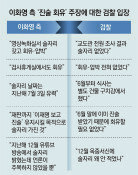Parliamentary dictatorship
Parliamentary dictatorship
Posted July. 01, 2020 07:38,
Updated July. 01, 2020 07:38
The Democratic Party of Korea has begun the evaluation of the revised supplementary budget bill of 35 trillion won – the largest figure so far – following its monopolization of the chair positions of the standing committees of the National Assembly. The Budget Settlement Committee exclusively composed of the ruling party held a plenary meeting for a comprehensive policy inquiry. After each standing committee will examine the agendas, final decisions will be made at a plenary session on July 3, the closing date of the provisional session of the National Assembly in June. This means that the ruling party has announced its plan to pass the supersize supplementary budget bill in just four days without the involvement of the opposition party.
As the economic crisis caused by COVID-19 is spreading from the service industry to the manufacturing industry, a growing number of companies are becoming marginalized and the vulnerable people’s livelihoods are in danger. Under the current situation, the third supplementary budget bill should be quickly processed. However, if the largest-ever supplementary budget is haphazardly passed in just four days, a lax and poor execution of the budget will be inevitable.
The National Assembly Budget Office pointed that the direct job creation project, to which 8.9 trillion won has been assigned among the supplementary budget submitted by the government, seems a little excessive. The office said that the budget set aside to create 1.55 million jobs, which is much higher than 1.28 million unemployed people, is excessive, even considering that it is meant for preparation against the employment crisis. Furthermore, the plan is full of one-off part-time positions, such as delivering books from libraries and patrolling the top 100 mountains in the country. The budget office also said that the South Korea New Deal project of 5.1 trillion budget has many plans that do not have clear purposes or cannot guarantee effects. The ruling party’s aggressive response to the office, saying that the office is “criticizing for criticism’s sake,” reflects a dictatorial mindset of not even accepting the opinions of a National Assembly organization established to hold the administration in check.
In just one day after the 16 standing committees exclusively consisting of the ruling party, the supplementary budget increased by three trillion won. The 160 billion won increase of the Health and Welfare Committee’s job creation budget – not its regular one – may be criticized for being overlapped with the budget set by the Ministry of Employment and Labor overseeing the committee. The ruling party’s tricks to include the budget items that should be part of the main budget in the supplementary budget have also been caught. The standing committees’ budget will be reduced by subcommittees of the Budget Settlement Committee, but the concern for haphazard evaluation seems inevitable.
The deficit-financing bond to be issued as part of the supplementary budget bill amounts to 23 trillion won. The responsibility to pay off the deficit-financing bond will fall on our people, especially the younger generations. The poor evaluation of the bill cannot be exonerated just because the government and the ruling party would like to work according to the schedule they set for themselves. The opposition party, although it is not participating in the standing committees, should conduct a close and in-depth evaluation of the bill and actively share the results with the public to check the ruling party.







